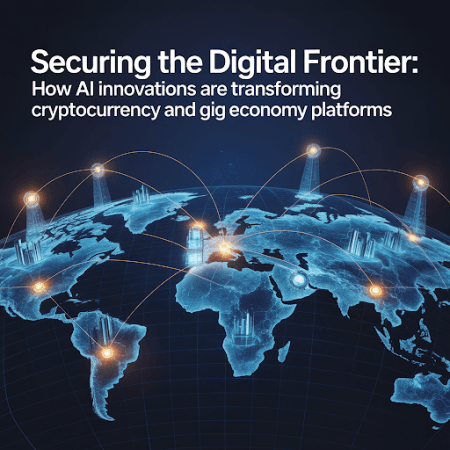
In an era where digital platforms are rapidly expanding, safeguarding financial transactions and user data has never been more critical. This article explores cutting-edge security innovations shaping the future of cryptocurrency and gig economy platforms, drawing from the insights of Prakash Manwani, an accomplished researcher in AI-powered cybersecurity. His expertise provides a timely lens into the evolving landscape of digital security.
The AI Revolution in Financial Security
Artificial intelligence is transforming financial security, especially as the digital gig economy grows toward 86 million U.S. workers by 2027. With cybercrime losses projected to hit $10.5 trillion annually by 2025, traditional defenses fall short. AI-powered solutions now provide real-time threat detection, anomaly spotting, and large-scale fraud prevention, meeting the evolving demands of digital finance.
Multi-Layered Defense: Cryptocurrency's AI Security Framework
Modern cryptocurrency platforms are fortifying their operations with multi-layered security powered by AI. These frameworks consist of several advanced components:
- Anomaly Detection Systems (ADS): These act as the first line of defense, using deep learning algorithms to detect unusual transaction patterns and thwart fraud before it occurs.
- Behavioral Analytics Engines: By continuously analyzing user behavior and transaction data, these systems can process transactions up to 25 times faster than traditional methods, enhancing both speed and security.
- Blockchain Surveillance: AI algorithms simultaneously monitor on-chain activities, enabling rapid identification of suspicious behaviors and reducing transaction latency by hundreds of milliseconds.
These innovations have translated into real-world impact. Financial institutions report a 54% increase in productivity and significant cost reductions from AI-driven systems, while exchanges process over 100,000 transactions per second without compromising security.
Reinventing Identity: AI in Gig Economy Validation
As digital platforms scale, the challenge of authenticating user identities and preventing fraud becomes more complex. Enter advanced AI-driven identity validation systems such as GigTrust. The technical architecture of these solutions blends multiple AI modules:
- Computer Vision: Deep learning processes analyze and authenticate documents and biometrics, streamlining onboarding without sacrificing accuracy.
- Graph Analytics: Pattern recognition tools perform real-time network analysis, flagging potential fraud with remarkable efficiency.
- Behavioral Analysis: Machine learning monitors activity, continuously adapting to new threats and enhancing risk assessment.
These innovations not only improve fraud detection and reduce verification friction but also boost user trust. Notably, cloud-based AI solutions are driving the global digital identity market, expected to more than double in value from 2023 to 2028.
Scaling Up: Technical and Regulatory Implications
The rapid rise of AI in security brings challenges in scalability and integration, especially as the AI-driven security market is set to reach $46.3 billion by 2030. Organizations must tackle issues like compatibility, data privacy, and compliance. Leading companies are now implementing privacy-preserving AI and strong governance frameworks to ensure user privacy and operational efficiency as data volumes continue to grow.
The Road Ahead: Quantum-Resistant Cryptography and Federated Learning
The future of security lies in integrating quantum-resistant cryptography to counter emerging quantum threats and adopting federated learning for privacy-preserving, distributed machine learning without centralized data storage. These advancements will significantly enhance authentication systems and data protection, setting new standards for digital platform security and ensuring robust defenses as technology continues to evolve.
In conclusion, the seamless fusion of AI with security frameworks is reshaping the digital landscape, providing proactive protection and adaptive solutions for both the cryptocurrency and gig economy sectors. Innovations in anomaly detection, identity validation, and advanced cryptography are fostering unprecedented transparency, efficiency, and trust. As Prakash Manwani emphasizes, these technological leaps are more than just defensive measures they are catalysts for secure and efficient digital growth, setting the stage for a new era of digital interaction.















